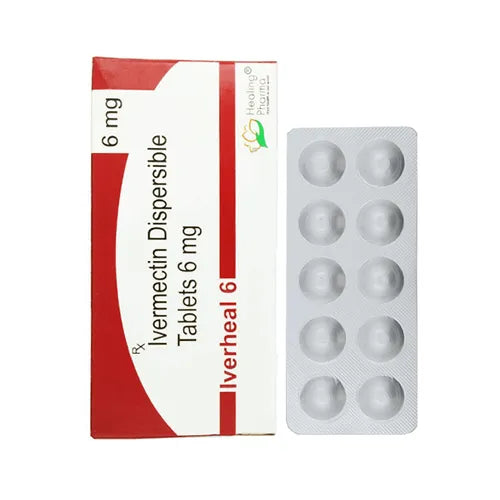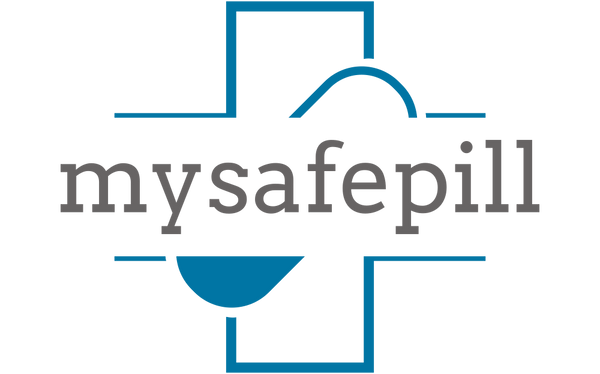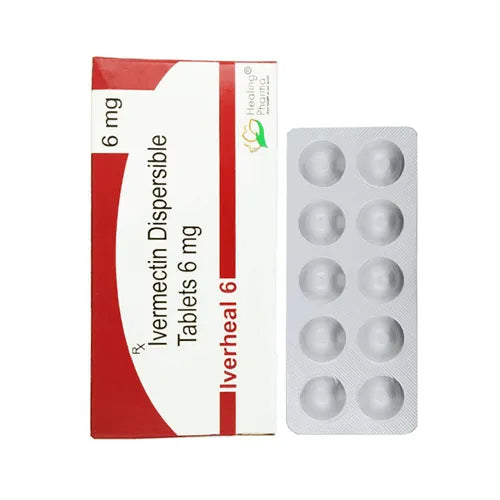Share
mysafepill
Ivermectin 6mg (Iverheal 6)
Ivermectin 6mg (Iverheal 6)
Couldn't load pickup availability
Product Details
Manufacturer / Marketer : Healing Pharma India Pvt Ltd
Pack Size : (1×10)
Active Ingredient : Ivermectin 6mg
Category : Parasitic infections
Dosage Form : Tablet / Oral
What is Ivermectin 6mg?
Ivermectin 6mg is an Oral/Tablet medicine that is used to treat various parasitic infections for Skin, Eyes, etc. It comes under the category of drugs/medicines which are known as antiparasitic agents.
Uses of Ivermectin 6mg
Some main uses and information about Ivermectin:
- Treatment of Parasitic Infections : Ivermectin is primarily used to treat a range of parasitic infections, including:
- Intestinal parasitic infections, such as strongyloidiasis and ascariasis.
- Skin conditions caused by parasites, like scabies and certain types of mites.
- River blindness also known as (Onchocerciasis) which is a disease caused by a parasitic worm.
- Lymphatic filariasis, another parasitic infection transmitted by mosquitoes.
- Mode of Action : Ivermectin works by paralyzing and killing parasites. It does this by disrupting the nervous system of the parasites, leading to their immobilization and eventual death.
- Veterinary Use : Ivermectin is also widely used in veterinary medicine to treat and prevent parasitic infections in livestock and pets.
- Not Approved for All Parasites : It's important to note that Ivermectin is effective against certain types of parasites but not all of them. It may not be the appropriate treatment for every parasitic infection.
If you are considering using Ivermectin for any purpose, it is crucial to consult a healthcare professional who can provide guidance on its appropriate use, dosage, and potential risks, as well as to ensure that it is the right treatment for your specific condition.
Additionally, the availability and approved uses of Ivermectin may vary by region and may have changed since my last knowledge update.Top of Form
Side effects of Ivermectin
Ivermectin is generally considered safe when used at recommended doses for its approved indications, but like any medication, it can cause side effects in some individuals. The Common side effects of Ivermectin tablets may be:
- Gastrointestinal Symptoms :-
- Nausea
- Vomiting
- Diarrhea
- Abdominal pain or discomfort
- Dizziness or Lightheadedness : Some people may experience dizziness or feeling lightheaded, especially when getting up from a sitting or lying position.
- Fatigue : Feeling tired or fatigued may occur as a side effect.
- Itching or Rash : Itching or skin rashes are rare but can occur as an allergic reaction to the medication.
- Eye Symptoms : In some cases, Ivermectin may cause eye irritation, redness, or swelling. This is more common when Ivermectin is used in higher doses for certain parasitic infections.
- Neurological Symptoms : Rarely, Ivermectin can lead to neurological symptoms, such as confusion, tremors, or seizures. These symptoms are more likely to occur when Ivermectin is used in high doses, especially in individuals with certain underlying conditions.
Some other side effects are :-
- Dizziness
- Headache
- Itching and skin rashes
- Loss of energy
- Weakness
- Stomach pain
- Seizures
- Shortness of breath
- Low blood pressure
- Increase heartbeat
- Face swelling
NOTE : While these side effects are possible, they are generally mild and transient. Serious side effects are rare when Ivermectin is used appropriately and at the recommended doses for its approved indications.
However, it's crucial to use Ivermectin under the guidance of a healthcare professional or veterinarian, depending on whether it is intended for human or animal use. Dosage and administration should be carefully determined based on the specific condition being treated, and the medication should not be used indiscriminately or without a proper diagnosis.
If you or someone you know experiences severe or unusual side effects after taking Ivermectin, it is important to seek medical attention promptly.
Dosage of Ivermectin
The dosage of Ivermectin can vary depending on several factors, including the specific parasitic infection being treated, the patient's age and weight, and the formulation of the medication (tablets, cream, or liquid). It's crucial to follow the prescribed dosage and instructions provided by a qualified healthcare professional or veterinarian, depending on whether it's intended for human or animal use. Below are general guidelines for the dosing of Ivermectin for some common indications:
For the Treatment of Intestinal Worm Infections (e.g., Ascariasis, Strongyloidiasis):
- In adults and children, a common dosage is a single oral dose of 200 micrograms (mcg) of Ivermectin per kilogram (kg) of body weight. This is typically administered as a single dose.
For the Treatment of Scabies:
- For the topical treatment of scabies, Ivermectin is often available as a cream or lotion. The specific instructions for its use will be provided by a healthcare professional.
- In some cases, oral Ivermectin may be prescribed, and the dosage will depend on the individual's weight and other factors.
For the Treatment of Onchocerciasis (River Blindness) or Lymphatic Filariasis:
- The dosing regimen for these conditions typically involves a single oral dose of Ivermectin, with the exact dosage based on body weight and specific guidelines provided by health authorities.
For Veterinary Use:
- Ivermectin is widely used in veterinary medicine, and the dosage varies depending on the type of animal, the specific parasitic infection, and the formulation of the medication (oral, injectable, or topical). Veterinarians provide guidance on the appropriate dosage for animals.
It's necessary to consult with a healthcare professional for the correct dosage and instructions, as they can provide guidance tailored to your specific situation. Do not use Ivermectin without proper guidance, as improper dosing can lead to inadequate treatment or an increased risk of side effects.
 Reliable
Reliable
 Secure
Secure
 Affordable
Affordable





